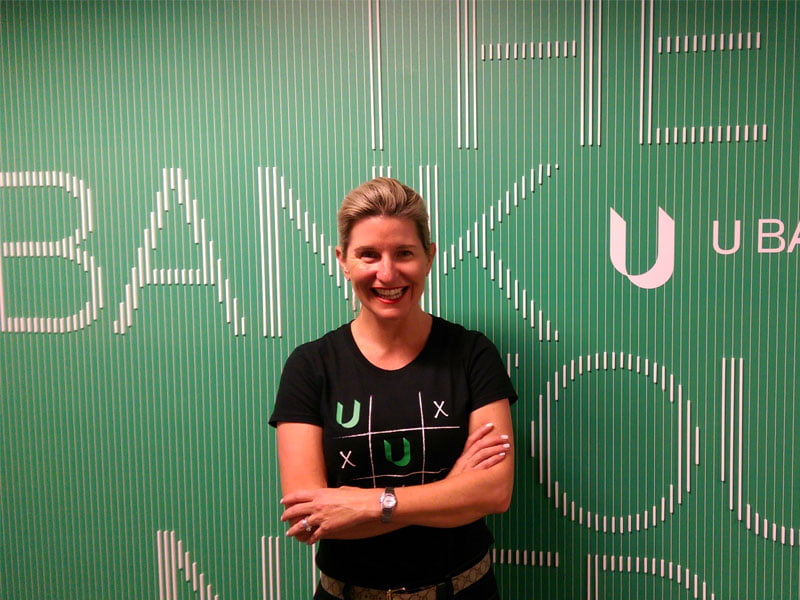Lee Hatton arrives with an Amazon Alexa device for one of UBank’s meeting rooms; she wants to know how people use it and whether it could become a new banking interface.
As UBank chief executive Ms Hatton is keen on experimentation as she builds out the digital platform to streamline and shift the way consumers interact with the bank.
That experimentation has already led to UBank axing a 144-question home loan desktop application, replacing it with a 24-question mobile app, and supplementing that with RoboChat, an artificially intelligent (AI) bot that guides consumers through the initial stages of a mortgage application.

Now she wants to know how Alexa might be used.
“There’s a lot of talk about IoT (the Internet of Things) and how get it working if you can’t use voice biometrics for your identity,” she said. “For us the opportunity is how to start tackling that now.”
Ms Hatton describes UBank – NAB’s digital-only banking subsidiary – as a “FinTech with a banking licence.” Nine years after launch, UBank has 400,000 account holders (“a lot” of them active according to Ms Hatton), a $6 billion loan portfolio, and $14 billion worth of deposits.
Before she was appointed UBank CEO in 2015, NAB asked Ms Hatton what she thought UBank should aspire to. She said it needed to be a “commercial and independent attacker.” Why? “Because the fast eat the slow.”
It’s particularly the case in financial services, which is being profoundly disrupted by technology.
“The easiest thing for a bank to do is build a like-minded bank, so you often see sub-brands or secondary brands. But it’s very rare for a bank that has brought an adjacency to itself that actually competes for its customers,” said Ms Hatton.
Other banks may strive to innovate but she said that as a rule “they are afraid of eating their own.”
“It takes a certain amount of resilience and boldness to have that attacker in your own group and a different type of talent and group of people to be able to bring that to life.”
Her lens on the innovation effort needed to deliver on her attacker ideal is to take a 70:20:10 split. “The 70 is things we’ve got to do, 20 per cent is like 80:20 should work, and 10 per cent is the things we are willing to risk. That way you keep a healthy tension in your culture.”
Also “We are super lean on these things – innovation here doesn’t cost a million dollars – innovation here can be as quick as someone here knowing someone who knew something who could borrow something,” she said.
UBank has a full complement of 180 staff, including a digital team of 40, and 60 in the contact centre.
Not that UBank innovates alone. It is attempting to build an innovation ecosystem. This includes partnering with organisations such as the University of Sydney’s Business School which has run MBA capstone projects with UBank, this year getting students to work on ways to encourage people to develop a savings habit.
It’s a key focus for UBank, which in July revealed a neuro-marketing experiment it had commissioned to understand what prompts people to save. The insights from that are helping shape an AI-fueled savings application slated for release later this year.
Ms Hatton has also collaborated with IBM, Google and Facebook, and opened up APIs to UBank services that she hopes will create a platform to engage more broadly with consumers.
“The world is full of collaboration now,” she said. “The better you can collaborate, the better you are at coming up with ideas.”
She would even like to collaborate with the archetypal banking disruptor Tyro.
“I think Tyro should call us. I think we would be a great partner for them. We are a bank. They have a (banking) licence – they need some good credit models.
“We move really fast and that’s why companies like IBM and Google and Facebook love working with us. If we say we are going to do something, we will get it done in the next six weeks and so we are really lucky we are allowed that sort of agility.”
Tyro may take some convincing of the cultural fit however. Last October the company hired Gerd Schenkel, UBank’s inaugural CEO, as its chief executive and charged him with developing Tyro’s “nextGen bank”. The arrangement lasted just eight months.
Ms Hatton has no comment about why Mr Schenkel left so soon, but she does explain why she believes UBank has an edge over rival FinTechs.
Formerly the head of regulation for the entire NAB Group, Ms Hatton has a keen understanding of banks’ compliance obligations and the need for strong trust between bank and customer.
“At our core is the fact that we are comfortable with how we are regulated. That gives us an edge over the other FinTechs.
“With government guarantees and things like that, we are all covered and that gives us that extra credibility piece for consumers out there now that are dabbling in non-safe and secure ways.”
Do you know more? Contact James Riley via Email.

